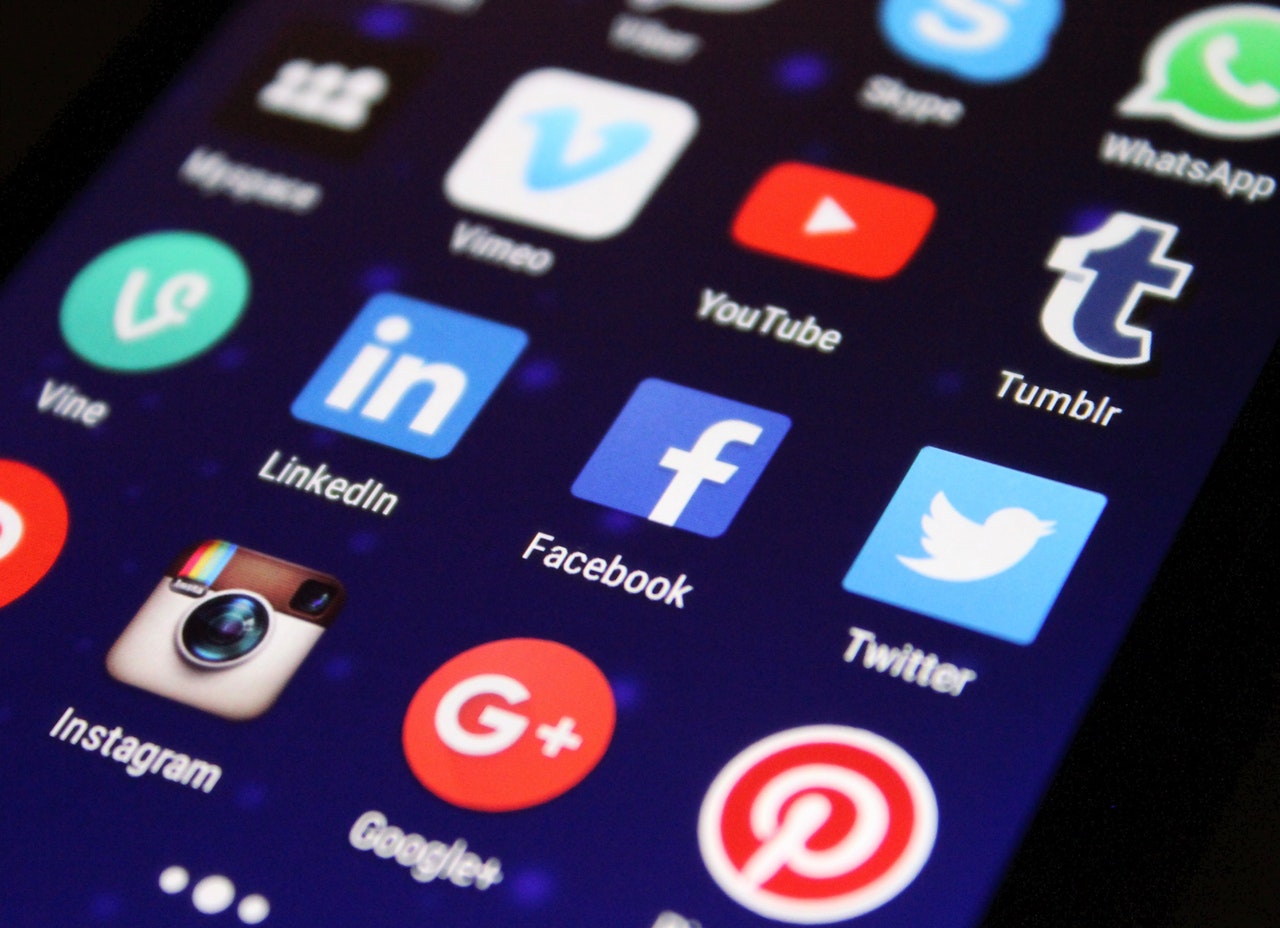So what is the difference between digital marketing and Social media? The short answer is that digital marketing is an umbrella term for SEO, Email Marketing, Content Marketing, Public Relations, Social Media, and more. Social media is just one of the many channels that make up a digital marketing campaign.
The terms “digital marketing” and “social media marketing” are often used interchangeably, even by people who work in these industries. Some will even believe they are engaging in digital marketing by implementing only social media.
However, if you are engaging in “digital marketing”, typically you are implementing several channels of digital marketing. For example, your business may create a digital marketing strategy that includes SEO, Email Marketing, Content Marketing, Analytics & Social media. If you are only engaged in one channel (like social media), you typically wouldn’t say that you have a digital marketing campaign in place. The digital marketing usually denotes the use of several online marketing channels.
What exactly is digital marketing?
The dictionary defines marketing as the action or business of promoting products and services to make them profitable. Add digital to the word, and you can change the definition to the action or business of promoting products and services through digital outlets to make them profitable.
Technical definitions aside, digital marketing is really about implementing a customized mix of digital marketing channels to accomplish any of the following goals:
- Growing your sales and profit
- Build awareness and develop a relationship with your audience
- Add Value: Implement inbound marketing strategies that will cause customers to seek you out
- Promote your brand, product or service
- And much more
Keep in mind, that you do not need to implement all available digital marketing channels to achieve your goals. Instead, you will create a customized mix of digital marketing channels that fit your brand, audience, and budget.
Not all marketing channels are going to have the same impact. The ideal digital marketing mix will depend on each business since each industry and audience will respond differently to different marketing channels. For this reason, oftentimes, you must implement strategies, test, change, test again and measure which strategies are working the best for your business. Then you can drop the marketing channels that are not delivering a satisfactory ROI or growth rate.
Does digital marketing go beyond the internet?

Here’s something else many people may not realize: Digital marketing isn’t a new concept. It’s been around for a long time — as long as radios and televisions have been in homes. It wasn’t just born with the Internet.
Yes, the Internet is part of that and so is social media. From Twitter to email marketing to SEO, you are partaking in digital marketing when you promote a business online. But there are several other mediums and outlets that take advantage of digital marketing, such as television, radio, and even digital signs and billboards. If you own a restaurant, and you have a digital sign out front that advertises the daily specials, you’re technically using digital marketing.
However, because consumers do so much of their researching, browsing, and shopping online these days, most companies are depending more on the Internet-related aspects of digital marketing, such as SEO, PPC, emails, banners, content, web, mobile, and yes, social media. In general, creating a digital marketing strategy takes time and results are almost never immediate.
What exactly is social media marketing?
Again, social media marketing is just one component, one channel, of digital marketing. It simply means marketing products and services via Twitter, Facebook, Instagram, Snapchat, Google+, YouTube, and other social networking sites. It typically involves engagement with followers, seeking out influencers, holding contests, posting content, live-streaming, and anything else you can do to grab people’s attention with a tweet or an update.
Compared to other types of digital marketing, many companies and brands can experience a quicker response from their social media campaigns, but most of the time it’s not enough. For this reason, it’s important for brands and businesses to not focus just on social media when marketing their products and services, but to use it in collaboration with as many other components of digital marketing as possible.
Why focus on social media marketing at all?

Social media marketing should go hand-in-hand with other forms of digital marketing, no matter what other forms you use or what type of company you work for. If you’re not sure why, you can start with the numbers.
Take Twitter, for example. Approximately 8,000 tweets are sent out per second. At the start of 2018, the social media site had over 330 million monthly active users, 69 million of which were located in the United States. Twitter users tend to be Millennials who are college-educated and have a higher-than-average income. They use the platform to discover new things, as well as for customer service. They also tend to follow their favorite small and medium businesses. And those numbers only apply to one of many social media platforms. You’ll find equally-enticing numbers for the other big social media sites.
Other reasons to focus on social media include:
- No need to create your own content: While you’ll want to share content you’ve created, and good content at that, there’s no need to create content just for the sake of your social media marketing campaign. You can jump right in and share content from others until you have your own. A large part of social media marketing is simply content curation.
- Engagement gets your name out there: Jump into conversations. Tweet influencers. Ask questions. Hold contests. Be genuine. It’s easy to gain attention if you do it the right way.
- It’s easy to search for what you’re looking for. If you sell baby products to new moms, just start searching for new moms posting baby pictures on Twitter and Instagram. Follow them. Like their picture. Leave a comment. There’s no months’ long research to do to find your target audience.
- You can post as much or a little as you like: though it’s important to know that posting too much can annoy your followers and post too little can make your followers forget about you. However, keep in mind that each social media platform has differences in how much is socially acceptable to post (each social media platform has its own culture & norms). For example, it would be acceptable to post many times a day on twitter. However, with Facebook, that level could annoy your audience.
- It’s fast: There is really no faster way to reach your customers or potential customers than by engaging them on social media.
Why focus on other aspects of digital marketing, too?

If social media sounds great, that’s because it is. Currently, it’s a must. It’s also a great place to start for new businesses, but it shouldn’t be your only iron in the fire. Why? Well, it can be time-consuming, especially if you don’t yet have the funds to hire someone to handle it for you. Conversion rates aren’t always high, and you’re playing on someone else’s turf. Compared to your own site, you don’t own your data and you may find yourself following some strict rules.
When you get into the other aspects of digital marketing, such as SEO, PPC, email marketing, banners, etc., you’ll eventually find that there are advantages that you can’t get from social media. Many of these digital marketing techniques bring users to you instead of you seeking them out as you might on social media. This new form of marketing has been dubbed inbound marketing, by HubSpot’s CEO Brian Halligan. In fact, inbound marketing techniques such as SEO and content marketing tend to be extremely effective in growing your brand equity and increasing ROI over time.
You also own your own data by utilizing inbound marketing via your own website. And believe it or not, not everyone has an Instagram account. While it may take longer to reach your audience, incorporating multiple types of digital marketing channels into your strategy not only will help you have a more comprehensive marketing funnel, it will help you reach a wider audience.
So which is better: Digital or Social Marketing?
If you are still thinking in terms of digital vs. social marketing, just remember that social media marketing is just a single part of digital marketing. Both can bring something important to your campaign, depending on your company’s goals. Digital marketing has been around for decades and it’s not going anywhere.
Social media is newer, but it’s become one of the most important types of marketing for many businesses. With few exceptions, no brand or company should put all of their focus into social media marketing, but it should be a central part of your process for the foreseeable future. Ideally, your social and other digital campaigns will work together, in harmony, to reach the most potential customers.









